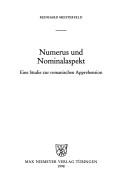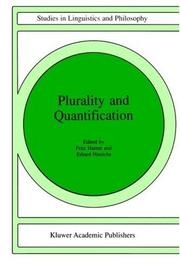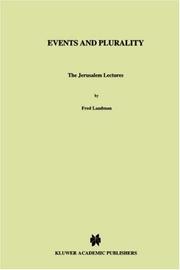| Listing 1 - 8 of 8 |
Sort by
|
Book
ISBN: 3533029328 9783533029328 Year: 1980 Volume: 10/1980 Publisher: Heidelberg: Winter,
Abstract | Keywords | Export | Availability | Bookmark
 Loading...
Loading...Choose an application
- Reference Manager
- EndNote
- RefWorks (Direct export to RefWorks)
Grammar, Comparative and general --- Semantics, Comparative --- Nombre (Linguistique) --- Personne (Linguistique) --- Sémantique comparée --- Number --- Person --- Sémantique comparée
Book
ISBN: 9782753511408 2753511403 Year: 2010 Publisher: Rennes Presses universitaires de Rennes
Abstract | Keywords | Export | Availability | Bookmark
 Loading...
Loading...Choose an application
- Reference Manager
- EndNote
- RefWorks (Direct export to RefWorks)
Lexicology. Semantics --- Grammar --- Français (Langue) --- Lexicologie. --- Nombres cardinaux --- catégorie (grammaire) --- Nombres cardinaux. --- Numéraux (linguistique). --- Nombre (linguistique). --- Nombre (Grammaire) --- Numéraux. --- Grammaire. --- Langage. --- nombre (grammaire) --- Français (Langue). --- Nombre (Grammaire). --- nombre (grammaire). --- Catégorie (grammaire) --- Nombre (grammaire).
Book
ISBN: 9780199570423 0199570426 1299746292 0191755869 0191644110 9780191644115 Year: 2013 Publisher: Oxford : Oxford University Press,
Abstract | Keywords | Export | Availability | Bookmark
 Loading...
Loading...Choose an application
- Reference Manager
- EndNote
- RefWorks (Direct export to RefWorks)
Alex Oliver and Timothy Smiley provide an account of plural logic. They argue that there is such a thing as genuinely plural denotation in logic, and expound a framework of ideas that includes the distinction between distributive and collective predicates, the theory of plural descriptions, multivalued functions, and lists.
Logic. --- Grammar, Comparative and general --- Logique --- Nombre (Linguistique) --- Number. --- Logic --- Reasoning. --- Argumentation --- Ratiocination --- Reason --- Thought and thinking --- Judgment (Logic) --- Deduction (Logic) --- Deductive logic --- Dialectic (Logic) --- Logic, Deductive --- Intellect --- Philosophy --- Psychology --- Science --- Reasoning --- Methodology
Book
ISBN: 9783110784589 3110784580 3110784696 Year: 2022 Publisher: Berlin/Boston De Gruyter
Abstract | Keywords | Export | Availability | Bookmark
 Loading...
Loading...Choose an application
- Reference Manager
- EndNote
- RefWorks (Direct export to RefWorks)
While previous research on collective nouns in Romance languages mostly adopts a semasiological and theoretical perspective focusing mainly on one single language, the present study takes an onomasiological and comparative approach which is strongly based on empirical evidence. Against this background and in analogy to the verbal domain, the work elaborates further the functional category of nominal aspectuality which describes the construal of extra-linguistic entities as well as the linguistic means reflecting it. In this sense, collective nouns are systematically compared with other (nominal) means of expression of collectivity in French, Spanish, Italian and Portuguese, focusing especially on object mass nouns, which have hardly been studied so far for Romance languages. On the basis of corpus analyses and acceptability judgement studies, a holistic picture is thus drawn of the semantic-syntactic and derivational properties of various noun types in the synchrony of present-day language as well as of the diachronic lexicalisation paths of these very nouns. The work thus contributes to the understanding of the verbalisation of pluralities by linking and complementing previous monodimensional approaches and, above all, by placing them on a broad empirical basis.
Corpora (Linguistics). --- Romance languages --- FOREIGN LANGUAGE STUDY / French. --- Collective nouns. --- Collectivity. --- Construction Morphology. --- Lexicalization. --- Nominal Aspectuality. --- Neo-Latin languages --- Italic languages and dialects --- Corpus-based analysis (Linguistics) --- Corpus linguistics --- Linguistic analysis (Linguistics) --- Aspect (linguistique) --- Nom --- Langues romanes --- Français (langue) --- Noms collectifs --- Nombre (linguistique) --- Corpora (Linguistics)

ISBN: 3484522933 9783484522930 3110933543 Year: 1998 Volume: 293 Publisher: Tübingen: Niemeyer,
Abstract | Keywords | Export | Availability | Bookmark
 Loading...
Loading...Choose an application
- Reference Manager
- EndNote
- RefWorks (Direct export to RefWorks)
Romance languages --- Grammar --- Grammar, Comparative and general --- Nombre (Linguistique) --- Nominaux --- Number. --- Nominals. --- Number --- Nominals --- -Grammar, Comparative and general --- -Romance languages --- -Neo-Latin languages --- Italic languages and dialects --- Comparative grammar --- Grammar, Philosophical --- Grammar, Universal --- Language and languages --- Philosophical grammar --- Linguistics --- Philology --- Grammar, Comparative --- -Nominals --- Nominals (Grammar) --- Noun-equivalents (Grammar) --- Substantives (Grammar) --- Neo-Latin languages --- Dual (Grammar) --- Number (Grammar) --- Plural (Grammar) --- Noun phrase --- Grammar, Comparative and general - Number --- Grammar, Comparative and general - Nominals --- Romance languages - Number --- LINGUISTIQUE ROMANE --- NOMBRE --- ASPECT NOMINAL
Book

ISBN: 3110293986 311029382X 129972096X 9783110293821 9783110293982 3110485346 Year: 2012 Publisher: Berlin Boston
Abstract | Keywords | Export | Availability | Bookmark
 Loading...
Loading...Choose an application
- Reference Manager
- EndNote
- RefWorks (Direct export to RefWorks)
Plural marking, numeral classifiers and reduplication constitute the main means of quantification marking in the domain of grammar. The contributions in this book focus on the typological correlation between the three different strategies for quantification, as well as on some general issues. A better understanding of the quantification strategies in the languages of China will enrich our comprehension of human language and thought. The book is expected to have an impact on the study of linguistic typology, language contact, and patterns of the evolution.
Chinese language --- Grammar, Comparative and general --- Sociolinguistics --- Quantifiers. --- Grammar. --- Number. --- China --- Languages. --- Chinois (Langue) --- Quantificateurs (Linguistique) --- Nombre (Linguistique) --- Sociolinguistique --- Quantifiers --- Classifiers --- Grammar --- Quantificateurs --- Classificateurs --- Grammaire --- Chine --- Languages --- Langues --- Language and languages --- Language and society --- Society and language --- Sociology of language --- Dual (Grammar) --- Number (Grammar) --- Plural (Grammar) --- Quantifiers (Linguistics) --- Social aspects --- Sociological aspects --- Language and culture --- Linguistics --- Sociology --- Integrational linguistics (Oxford school) --- Sino-Tibetan languages --- Philology --- Chinese Languages. --- Grammaticalization. --- Language Contact. --- Linguistic Typology. --- Non-Han Languages.

ISBN: 0792348419 9048149436 9401727066 Year: 1997 Volume: 69 Publisher: Dordrecht ; Boston ; London Kluwer academic publishers
Abstract | Keywords | Export | Availability | Bookmark
 Loading...
Loading...Choose an application
- Reference Manager
- EndNote
- RefWorks (Direct export to RefWorks)
The papers in this volume address central issues in the study of Plurality and Quantification from three different perspectives: • Algebraic approaches to Plurals and Quantification • Distributivity and Collectivity: Theoretical Foundations • Distributivity and Collectivity: Empirical Investigations Algebraic approaches to the semantics of natural languages were in dependently introduced for the study of generalized quantification, pred ication, intensionality, mass terms and plurality. The most prominent modern advocate for an algebraic theory of plurality (and mass terms) is certainly Godehard Link. It is indicative of the Wirkungsgeschichte of Link's work that most of the contributions in this volume take the logic of plurals proposed by Godehard Link (Link 1983, 1987) as their foundation or, at the very least, as their point of reference. Link's own paper in this volume provides a concise summary of many of the central research issues that have engaged semanticists during the last decade. Link's paper also contains an extensive bibliography that provides an excellent resource for scholars interested in the semantics of plurals. Since we can refer readers to Link's paper for an excellent survey of the subject matter of this book, we will limit our attention in this in troduction to summarizing the individual contributions in this volume. The book is organized into three main sections; within each section the papers are ordered alphabetically. However, as in much of linguistic the orizing, there is an exception: for reasons pointed out above, Godehard Link's article appears as Chapter 1.
Mathematical linguistics --- Nombre (Linguistique) --- Quantificateurs (Linguistique) --- Number. --- Quantifiers. --- #SBIB:309H514 --- Linguistiek --- Philosophy of language --- Mathematical logic --- Grammar, Comparative and general --- Grammar [Comparative and general ] --- Number --- Quantifiers --- #SBIB:AANKOOP --- Language and languages --- Quantifiers (Linguistics) --- Dual (Grammar) --- Number (Grammar) --- Plural (Grammar) --- Semantics. --- Syntax. --- Language and languages—Philosophy. --- Logic. --- Philosophy of Language. --- Argumentation --- Deduction (Logic) --- Deductive logic --- Dialectic (Logic) --- Logic, Deductive --- Intellect --- Philosophy --- Psychology --- Science --- Reasoning --- Thought and thinking --- Formal semantics --- Semasiology --- Semiology (Semantics) --- Comparative linguistics --- Information theory --- Lexicology --- Meaning (Psychology) --- Methodology --- Linguistics --- Philology

ISBN: 0792365690 9401143595 0792365682 Year: 2000 Volume: 76 Publisher: Dordrecht Boston Kluwer Academic Publishers
Abstract | Keywords | Export | Availability | Bookmark
 Loading...
Loading...Choose an application
- Reference Manager
- EndNote
- RefWorks (Direct export to RefWorks)
JERUSALEM LECTURES In 1992, I was a Lady Davis Fellow in the English Department at the Hebrew Univer sity of Jerusalem. In the context of this, Edit Doron asked me to present a series of weekly evening lectures. The idea was that I would be talking about my own current research on plurality in an event based theory, without the restraints that a nonnal seminar fonnat would im pose: i.e. the idea was that I would actually get to the part where I would talk about my own work. At the same time, Edit added, it would be nice if, rather than just presupposing or presenting a neo-Davidsonian framework to develop my analysis of plurality, I could provide a more general setting of the problems by discussing in some depth the archi tecture of event arguments and thematic roles. In particular, Terry Parsons' book, Par sons 1990, had appeared relatively recently, and there was real interest among the audience in discussing Parsons' arguments for events and roles.
Lexicology. Semantics --- Davidson, Donald --- 801.56 --- Syntaxis. Semantiek --- 801.56 Syntaxis. Semantiek --- Grammar [Comparative and general ] --- Number --- Grammar, Comparative and general --- Grammar, Comparative and general. --- Number. --- Grammaire comparée et générale --- Nombre (Linguistique) --- Semantics. --- Language and languages—Philosophy. --- Logic. --- Computational linguistics. --- Philosophy of Language. --- Computational Linguistics. --- Formal semantics --- Semasiology --- Semiology (Semantics) --- Comparative linguistics --- Information theory --- Language and languages --- Lexicology --- Meaning (Psychology) --- Automatic language processing --- Language data processing --- Linguistics --- Natural language processing (Linguistics) --- Applied linguistics --- Cross-language information retrieval --- Mathematical linguistics --- Multilingual computing --- Argumentation --- Deduction (Logic) --- Deductive logic --- Dialectic (Logic) --- Logic, Deductive --- Intellect --- Philosophy --- Psychology --- Science --- Reasoning --- Thought and thinking --- Data processing --- Methodology
| Listing 1 - 8 of 8 |
Sort by
|

 Search
Search Feedback
Feedback About UniCat
About UniCat  Help
Help News
News